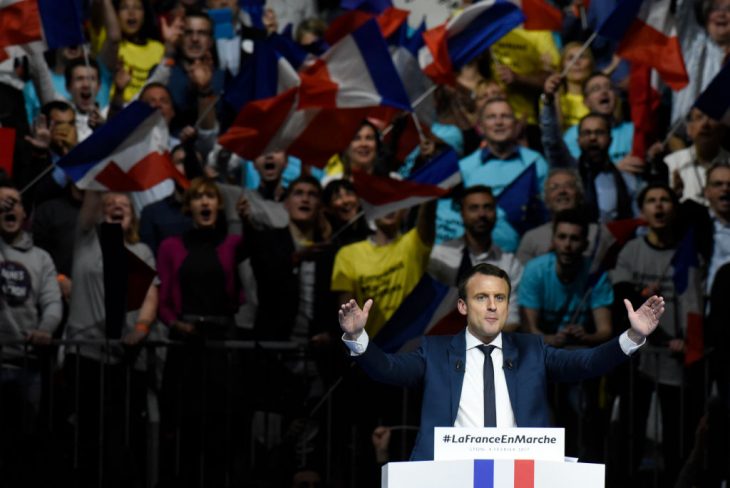I have a friend who lost three members of his family when an Islamic extremist drove a truck down the Promenade des Anglais in Nice on Bastille Day. When we saw each other at Christmas he said he had yet to decide whether to cast his vote for François Fillon or Marine Le Pen in the election, the two presidential candidates he considered best placed to restore law and order to France. When I asked what he thought of Emmanuel Macron he laughed. It was a cold contemptuous laugh.
In the weeks since, I’ve conducted my ‘Macron Test’ on a number of occasions, throwing his name into the conversation with my French friends to gauge their reaction. Laughter is the recurring theme. ‘Macron!’ exclaimed one on Sunday, as we returned on the Eurostar to Paris after watching the rugby at Twickenham. ‘All style and no substance. He’s our Tony Blair’.
It’s a good comparison because there are striking similarities between the 39-year-old Macron, and Blair, four years older when elected Prime Minister in 1997: young, successful, dynamic and obsessed with their image. Like Blair, Macron promises to lead his country into a prosperous new era with his progressive En Marche! [Let’s Go!] party. He boasts that he’s a moderniser, an innovator, a globalist and he’s going to make France great again. He’s not as talkative when it comes to Islamic extremism, immigration and inner-city lawlessness.
Macron was at it again on Monday, turning up unannounced at a Parisian theatre where his supporters had gathered for a convention. He soon had them rolling in the aisles with a series of witty one-liners and the press coverage the following day was suitably fawning. That’s the key to Emmanuel, as it was with Tony two decades ago. The majority of the media can’t get enough of him, smitten by his intellect, his charm, his openness and his boyish good looks. It’s not just in France that this sycophancy is becoming a little embarrassing. The Sunday Times ran a full page on Macron at the weekend under the headline, ‘France’s Young Meteor Blazes Trail to Élysée’. ‘Witty and energetic, he has an intellect that glitters even by French standards’, gushed the paper.
In fact, it’s this intellect that could prove fatal to Macron’s presidential hopes. As François Fillon has recently discovered, France is changing. It’s no longer the country that ignores malfeasance from its politicians, and it’s no longer the country where intellectuals are idolised. Macron’s trouble is that he may be too clever by half.
When Macron addressed a conference last month at Humboldt University in Berlin he spoke in English. The Germans loved it, just as the French did in 1998 when Tony Blair became the the first British Prime Minister to address their National Assembly in their own language. He used that occasion to outline his vision of Europe, telling his audience ‘as I watch my children grow up now, I want them to live in a Europe in which they feel as at home in the glory of Paris, the beauty of Rome, the majesty of Vienna as they do in their own London, where they enjoy a Europe peaceful, secure and prosperous’. But Macron’s speech, in which he warned against the dangers of closing national borders, didn’t impress Le Figaro, which said:
‘In refusing to embody France when he’s abroad, in restricting the French language only to his own people, from now on treated like provincials ill-suited to the demands of globalisation, Macron has revealed the rather poor impression he has of the country of which he wants to be president’.
That’s not how his supporters see it, of course. In the chic bistros of Paris Macron is all the rage, as Blair was in the trendy bars of London twenty years ago. Macron makes the Parisian Millennials feel good about themselves when he tweets rebukes to Donald Trump in the President’s own language. This is the real France, they tell the world, not Marine Le Pen.
In 1997, Blair offered a similar dream to his young, metropolitan supporters; a break with the past, a new Britain for a new Millennium, one that was far removed from John Major’s vision of a ‘country of long shadows on county (cricket) grounds, warm beer, invincible green suburbs, dog lovers and pools fillers’.
Macron says he wants to help ‘each French person find their place in a changing world’, a message that resonates in his milieu, among confident and ambitious Parisians who share his ideals. But out in the provinces, where people are angry, anxious and frightened about what the future holds? They regard Macron with deep distrust, all this talk of his of being ‘neither left, neither right’. When Blair addressed the French Assembly in 1998 he spoke in a similar vein, explaining his Third Way as means to ‘provide security in a world of change’. He continued:
‘To some, the New Labour Government in Britain exhibits what they call an ideological confusion…but to me, there is no confusion. There is, instead, an attempt to make realistic sense of the modern world. It is a world in which love of ideals is essential, but addiction to ideology can be fatal. It is a world in which people seek from their Governments not dogma and doctrine, but a strong sense of national purpose, underpinned by clear values.’
When Blair stepped aside in 2007 he left behind a Britain with neither national purpose nor clear values, and the fear among many in France outside Paris is that Macron’s legacy would be similar if elected president.







Comments